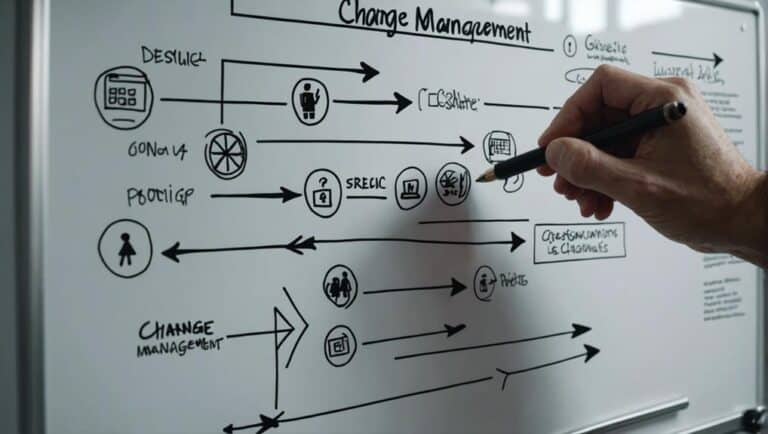The modern business landscape has faced major shifts over the last decade or so, particularly in leadership. Accordingly, the demands of the contemporary manager are changing rapidly due to factors such as globalization, inclusion, and diversity. So, can a projector manager be a change manager?
A project manager can be a change manager. Most of the duties, responsibilities, and functions of project management are largely similar to those of a project manager. Therefore, a good project manager can be a good change manager and vice versa.
In this article, I will answer important questions related to this topic. I will also explore whether a project manager can become a change manager, some of the adjustments that the project manager would have to make to be a sound change manager and some similarities between the two roles.
Why a Project Manager Can Be a Change Manager
A project manager can be a change manager. In fact, according to Healthcare IT News, project managers should essentially be thought of as change managers. This is because project managers oversee projects, large or small, which result in a significant change to an organization.
After all, the main responsibility of a change manager is to steer an organization through a change process. Similar sentiments are offered by Project Insight, which notes that the role of the project manager is changing to include the responsibilities of a change manager.
According to Project Insight, the function of the project manager and the change manager are becoming similar. In essence, both managers share the role of ensuring that an organization is able to reach its goals.
One of the main distinguishing factors between a project manager and a change manager is that the former focuses mostly on the technical aspects of a project. In contrast, the latter focuses on the people side. However, in most small companies, managers are expected to handle both goals.
In an ideal situation, organizations have both a project manager and a project manager all reporting to the project sponsor. For smaller companies, these roles tend to coalesce.
Because change is inevitable, the project manager is responsible for steering their team and minimizing disruptions so that the deliverables are met. The project manager is also, within this context, acting as a change manager.
Therefore, while the wording in the definitions of what a change manager and what a project manager differ, they are both working towards arguably similar goals. As long as the manager in question is competent, they can be very effective change managers.
For a better understanding of change management and project management, let us first define both concepts below:
Change Management
Change management is defined as a process through which the change manager initiates and maintains change in an organization or among people and groups. To be an effective change manager, you need to be adept at training employees prior to introducing said changes.
This allows a smooth transition and minimizes disruptions to the company’s operations. Change management falls under strategic planning, which is a process through which the organization leader defines a vision and outlines the goals and objectives of the company.
What sets a change manager aside from other managers is that they have the sole responsibility of overseeing the change. He or she should have a sound understanding of how everyone’s roles in the organization fit into the overall vision and goal.
He or she should also make sure that each member of the company is aware of their responsibilities and aligned with the new organizational direction.
Project Management
Project management involves using specialized skills, techniques, tools, and knowledge to drive a given project to fruition. Unlike change management, where the transition period can be extensive, all projects have a start date and an end date.
Project management is evolving in nature, largely due to global forces and rapid technology. As a result, an organization will organize various aspects of work around projects, each with its own goals. The project manager’s role is to ensure that the team members accomplish this work.
Projects vary in size and magnitude. For instance, some projects are short-term and created to resolve urgent problems or to introduce a minor improvement, while others take much longer. Such projects include producing a new product or introducing significant improvements.
In the same way that failures in change management could result in costly financial losses, failures in project management could result in heavy financial losses on the side of the project sponsor.
Similarities Between Change Management and Project Management
There is a somewhat blurring of the line when it comes to project management and change management, especially in the contemporary business environment where one is expected to be adept in both.
Below are a few areas of convergence that suggest that a project manager can be a change manager.
Both Guide Teams Through Project Change
One of the differences between a project manager and a change manager in the existing literature is scope. While the change manager is responsible for organization-wide members, a project manager is responsible for their team members. The gist of it, however, remains the same.
By being able to guide a team through a period of change during the life of the project, the project manager is, in essence, acting as a change manager. Remember, projects, just like organizational changes, are prone to disruptions when people and processes clash.
People and Processes
As hinted above, organizations are mainly about people and processes, and so are project management and change management. In fact, people and processes are the two main components of change. Thus, project management and change management are more complementary than they are different.
Therefore, a prudent project manager should be able to handle both the people and process options to oversee the change process adequately. After all, communication is an important quality for a good manager.
A skilled project manager should be able to communicate with the team members and get them on board and aligned with the organizational goals.
Depending on the size of the organization and the magnitude of change, they would have to give up on project management to ensure that they have the time and resources to manage the transition.
Adjustments a Project Manager Would Need To Make
Just because a project manager can become a change manager, it is not a guarantee that they will be good at it. It is crucial to appreciate that as a change manager, the project manager will be swimming in unfamiliar waters.
This notwithstanding, below are some guidelines that a project manager can follow to be an effective change manager.
- Keep open and effective lines of communication. This will make it easy to deliberate with various stakeholders and promptly disseminate information about expected changes or any change management plans.
- Set manageable goals and manage these goals throughout the transition period. It is important to keep your foot on the gas until you have achieved the desired organizational goal.
- Manage risks. As a change manager, you need to create a sound risk management framework in order to identify, evaluate and control foreseeable change events.
- Make it clear that all plans are subject to change. Most organizational changes will not run smoothly against the strategic plan. It is important to have the staff members understand that change is inevitable.
How Can a Project Manager Utilize Change Management as a Soft Skill?
A project manager can utilize change management skills perspective to effectively handle transitions within a team. By understanding the human aspect of change and employing communication and influence tactics, they can navigate resistance and maintain productivity. This skill set enables them to lead with empathy and adaptability, fostering a positive work environment.
Conclusion
Project management and change management have similar aspects that suggest that a project manager can become a change manager, as evident in this article. However, how well a project manager can fit into the change management role can be mediated by factors such as the magnitude of change and the size of the organization.
This notwithstanding, with the recommended adjustments, a project manager can easily fill the boots of a change manager.
Sources
- Techtarget: Strategic Planning
- Project Management Institute: What is Project Management?
- Change Statistics: Why You Need a Change Manager: Roles, Responsibilities, and Benefits
- Healthcare IT News: Think of Project Managers as Change Agents
- Project Insight: Why Project Managers Are Also Becoming Change Managers
- Ocmsolution: What are the Key Differences? Change Management vs Project Management – Everything You Need to Know
- Indeed: Project vs. Change Manager: What’s the Difference?





